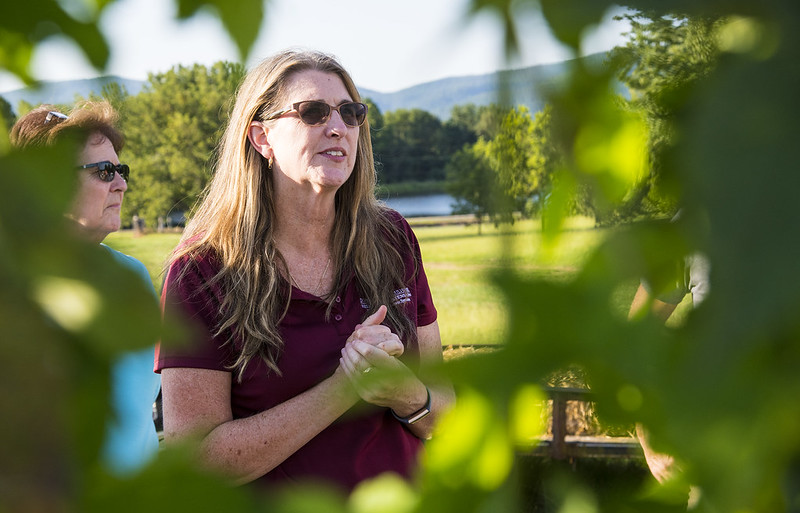July 27, 2020
Cheers! Groundwork laid for program to elevate Arkansas wine, encourage consumers
By Mary Hightower
U of A System Division of Agriculture
Fast facts:
- Arkansas Quality Wine program begins this fall
- Program to provide wine quality standards
- Program will also provide sensory, chemical feedback to winemakers
(706 words)
(Download this story in MS Word format here.)
FAYETTEVILLE, Ark. — A network of Arkansas research scientists, horticulture experts and others has laid the groundwork for a program that will set quality standards for Arkansas-made wine, provide professional development for growers and winemakers and entice consumers to taste the fruit of the state’s vines and their unique flavors.
Renee Threlfall, a research scientist at the University of Arkansas System Division of Agriculture, will serve as director of the Arkansas Quality Wine program, or AQW. The program will be established as part of a project funded by a specialty crop block grant from the Arkansas Department of Agriculture. Other project team members include Amanda McWhirt, extension horticulture crops specialist for the Division of Agriculture and Amanda Fleming, a food science graduate student who is also the head winemaker at Post Winery.
“The program is inspired by other wine classification systems that ensure high standards and celebrate the unique characteristics each area brings to its wines,” Threlfall said. “Arkansas has great wine and we want our consumers to be able to recognize the value of this industry.”
The Arkansas winemaking industry began in the late 1800s with German-Swiss immigrants who made sacramental wine as well as table wines. In 2012, the latest year for which economic impact figures are available, Arkansas’ 13 wineries reported $20.3 million in retail sales and contributed $173 million to the state economy. Arkansas currently has 30 grape growers and 16 wineries with the potential for industry growth.
“I think the Arkansas grape and wine industry has needed a program like this to help with the unification and expansion of this industry and we are thrilled with the support we are getting from the industry for this program,” Threlfall said. “Although this project is only two years, we hope to ensure the continuation of the AQW by partnering with the Arkansas Wine Producers Council and the Arkansas Grape Growers Association.”
Audrey House, owner of Chateaux aux Arc and chair of the Arkansas Wine Producers Council said she’s “excited to work with Dr. Threlfall on the AQW program for developing value-added marketing and quality assurance of Arkansas-grown wines. This is an essential element in recognizing our great state’s history of winegrowers and future presence in the global wine market.”
Doug Hausler, owner of Keels Creek Winery, said that “as an analytical chemist for over 40 years and a small winery and vineyard owner for 16 years, the implementation of a wine quality program in Arkansas is welcomed news and should enhance the quality wines produced in Arkansas.”
“Post is glad to be sharing winemaker Amanda Fleming’s talents statewide and hope that the industry can make good use of the University of Arkansas System Division of Agriculture’s efforts and the information that it generates,” Paul Post, president of Post Winery, said. “We hope the AWQ program will point out problems areas and bring new ideas to improve the overall quality and quantity of Arkansas wines.”
AQW will include extension outreach, helping grape growers increase crop production, improving techniques for home and commercial, as well as creating marketing materials to raise public awareness of Arkansas wines.
Quality standards
Threlfall said the program will establish quality standards for commercial wines made mostly from Arkansas-grown grapes. The commercial wines will be submitted and evaluated during an annual wine competition. Not only will the appearance, aroma and tastes of the wines be evaluated by expert wine judges, but the wines will also have to meet chemical standards.
“The sensory evaluation and analysis of chemical attributes of the wines entered in the competition will be used as indicators of quality and provide wineries with clear, measurable metrics for progress through feedback from wine judges after sensory evaluation and reports on the chemical analysis,” Threlfall said.
Wines that earn AQW status can use the AQW seal on each bottle of wine produced as well as receive recognition on AQW marketing materials. She said she hopes that AQW wines will provide the industry an opportunity to consumers “to identify and try premier Arkansas wines.”
“The AQW will be a great benefit to Arkansas winemakers and winegrowers alike,” said Dennis Wiederkehr, president of Wiederkehr Wine Cellars, Inc. “Actually, a program like this can extend beyond the borders of Arkansas and benefit the region.”
To learn more about extension and research programs in Arkansas, visit https://uada.edu, Follow us on Twitter at @AgInArk, @uaex_edu or @ArkAgResearch.
About the Division of Agriculture
The University of Arkansas System Division of Agriculture’s mission is to strengthen agriculture, communities, and families by connecting trusted research to the adoption of best practices. Through the Agricultural Experiment Station and the Cooperative Extension Service, the Division of Agriculture conducts research and extension work within the nation’s historic land grant education system.
The Division of Agriculture is one of 20 entities within the University of Arkansas System. It has offices in all 75 counties in Arkansas and faculty on five system campuses.
Pursuant to 7 CFR § 15.3, the University of Arkansas System Division of Agriculture offers all its Extension and Research programs and services (including employment) without regard to race, color, sex, national origin, religion, age, disability, marital or veteran status, genetic information, sexual preference, pregnancy or any other legally protected status, and is an equal opportunity institution.
# # #
Media Contact: Mary Hightower
Chief Communications Officer
University of Arkansas System Division of Agriculture
mhightower@uada.edu
501-671-2006
